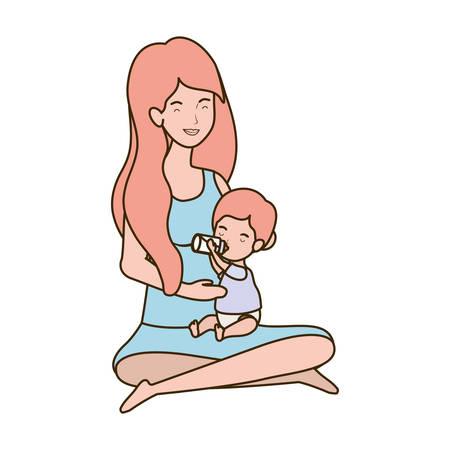1. Understanding Sleep Challenges in the Third Trimester
The third trimester of pregnancy can be exciting, but it also brings new challenges—especially when it comes to sleep. As your belly grows and your body prepares for labor, you may experience a variety of sleep disruptions that make it harder to rest comfortably.
Common Sleep Disruptions
Many pregnant women struggle with sleep issues during the third trimester. Here are some of the most common problems:
| Sleep Disruption | Why It Happens |
|---|---|
| Back Pain | Your growing baby puts extra pressure on your spine and muscles, causing discomfort that makes it difficult to find a comfortable sleeping position. |
| Frequent Urination | The uterus presses on your bladder, making you feel like you need to use the bathroom more often—even during the night. |
| Heartburn | Pregnancy hormones relax the valve between your stomach and esophagus, leading to acid reflux and heartburn, which can worsen when lying down. |
| Leg Cramps | Your changing circulation and extra weight can lead to muscle cramps in your legs, often waking you up in the middle of the night. |
| Shortness of Breath | Your expanding uterus pushes up against your diaphragm, making it harder to breathe deeply when lying down. |
The Impact of Poor Sleep on Your Well-Being
Lack of sleep can leave you feeling exhausted during the day, affecting your mood, energy levels, and overall well-being. It can also contribute to increased stress and discomfort as you prepare for labor. Understanding these challenges is the first step toward finding solutions that help you rest better.
2. Creating a Comfortable Sleep Environment
As your belly grows in the third trimester, getting comfortable in bed can feel like a challenge. A well-optimized sleep environment can make all the difference. Here are some key factors to consider when setting up your bedroom for better sleep.
Choosing the Right Mattress Support
Your mattress plays a crucial role in how well you sleep. A mattress that is too soft may not provide enough support, while one that is too firm can create pressure points. If your current mattress isn’t comfortable, consider using a mattress topper for extra cushioning and support.
Pillow Positioning for Maximum Comfort
The right pillows can help alleviate pressure on your back, hips, and belly. Try these pillow placement techniques:
- Between your knees: Helps align your hips and reduce lower back strain.
- Under your belly: Provides gentle support as your bump grows.
- Behind your back: Prevents rolling onto your back and offers extra support.
Controlling Room Temperature
Pregnancy can make you feel hotter than usual, so keeping your bedroom cool is essential. The ideal sleep temperature is around 65-70°F (18-21°C). Here are some tips to maintain a comfortable sleeping temperature:
| Tip | Description |
|---|---|
| Use breathable bedding | Cotton sheets and lightweight blankets help regulate body temperature. |
| Keep air circulating | A ceiling fan or bedside fan can provide airflow and prevent overheating. |
| Avoid heavy pajamas | Opt for loose, moisture-wicking sleepwear to stay cool. |
| Adjust thermostat | If possible, set the room temperature to a cool but comfortable level. |

3. Best Sleep Positions for Pregnancy
As your belly grows, finding a comfortable sleeping position can become challenging. The right sleep position can help improve circulation, reduce discomfort, and promote better rest. Experts recommend sleeping on your side—specifically, the left side—for optimal blood flow to your baby and vital organs.
Why Is Left-Side Sleeping Recommended?
Sleeping on your left side is considered the best position during pregnancy because it helps improve circulation, reduces pressure on the liver, and allows for better oxygen and nutrient flow to the placenta. It may also help reduce swelling in your legs and feet.
How to Use Pillows for Extra Support
Pillows can make a significant difference in improving comfort while you sleep. Here are some ways to use them effectively:
| Pillow Placement | Benefit |
|---|---|
| Between your knees | Keeps your hips aligned and reduces lower back pain |
| Under your belly | Provides gentle support and reduces strain on your abdomen |
| Behind your back | Prevents rolling onto your back and offers extra stability |
| A full-body pregnancy pillow | Offers all-around support for maximum comfort |
Avoid Sleeping on Your Back or Stomach
Lying flat on your back can put pressure on major blood vessels, leading to dizziness and reduced circulation. Stomach sleeping becomes uncomfortable as your bump grows, making it an impractical option later in pregnancy.
Tips for Staying in a Comfortable Position All Night
- If you tend to roll onto your back, place a pillow behind you for support.
- Avoid very soft mattresses that don’t provide enough support for proper spinal alignment.
- If hip pain wakes you up, try placing an extra pillow between your knees for added relief.
- A wedge pillow under your belly can help take pressure off your lower back.
By choosing the right sleep position and using pillows strategically, you can improve comfort and get better rest during the third trimester.
4. Establishing a Relaxing Bedtime Routine
As your belly grows and discomfort increases in the third trimester, getting a good nights sleep can feel nearly impossible. However, creating a relaxing bedtime routine can help signal to your body that its time to wind down and prepare for rest.
Why a Bedtime Routine Matters
A consistent bedtime routine helps regulate your bodys internal clock, making it easier to fall asleep and stay asleep. By engaging in calming activities before bed, you can reduce stress, ease physical discomfort, and improve sleep quality.
Relaxing Activities to Try
Incorporating soothing activities into your evening routine can make a big difference. Here are some ideas:
| Activity | How It Helps |
|---|---|
| Prenatal Yoga | Gentle stretching relieves tension, improves circulation, and promotes relaxation. |
| Warm Bath | The warmth soothes sore muscles and signals your body that its time to sleep. |
| Aromatherapy | Scents like lavender can create a calming atmosphere and reduce anxiety. |
| Reading a Book | Avoiding screens while enjoying a book can help your mind unwind naturally. |
| Meditation or Deep Breathing | These techniques lower stress levels and help clear your mind before bed. |
Avoiding Screens Before Bed
The blue light emitted by phones, tablets, and TVs can interfere with melatonin production, making it harder for you to fall asleep. Try switching off electronic devices at least an hour before bedtime and opt for activities like reading or journaling instead.
Creating a Comfortable Sleep Environment
Your bedroom should be a calm, restful space. Consider using blackout curtains to keep the room dark, setting the temperature to a cool but comfortable level, and using pillows designed for pregnancy support to reduce discomfort.
5. Managing Common Sleep Disruptors
During the third trimester, getting a good nights sleep can feel nearly impossible due to common discomforts like leg cramps, acid reflux, and frequent bathroom trips. Here’s how you can manage these issues to improve your sleep quality.
How to Deal with Leg Cramps
Leg cramps are a common issue in late pregnancy, often striking in the middle of the night and disrupting sleep. Here are some ways to prevent and relieve them:
| Cause | Solution |
|---|---|
| Dehydration | Drink plenty of water throughout the day. |
| Lack of minerals | Ensure youre getting enough magnesium and potassium through diet or supplements (consult your doctor first). |
| Poor circulation | Stretch your legs before bed and try prenatal yoga. |
| Prolonged sitting or standing | Take breaks to move around and elevate your legs when possible. |
How to Reduce Acid Reflux
Acid reflux tends to worsen in the third trimester as your growing baby puts pressure on your stomach. Try these tips for relief:
- Avoid large meals: Eat smaller, more frequent meals instead of heavy dinners.
- Stay upright after eating: Wait at least two hours before lying down.
- Elevate your upper body: Use extra pillows or a wedge pillow to keep your head elevated while sleeping.
- Avoid trigger foods: Spicy, acidic, or fried foods can worsen reflux—keep track of what affects you the most.
- Drink fluids wisely: Sip water throughout the day instead of drinking large amounts at once, especially before bed.
How to Manage Frequent Bathroom Trips
The need to urinate frequently is another major sleep disruptor during the third trimester. While this cant be completely avoided, you can minimize its impact on your sleep:
- Reduce fluid intake before bed: Drink plenty of water during the day but cut back an hour or two before bedtime.
- Empty your bladder fully: Lean forward slightly when using the restroom to ensure complete bladder emptying.
- Avoid caffeine: Coffee, tea, and soda can increase urine production and should be limited in the evening.
- Use nightlights: Instead of turning on bright lights during nighttime trips, use dim nightlights to avoid waking yourself up completely.
By managing these common sleep disruptors, you can increase your chances of getting better rest during the third trimester. Small adjustments in your daily habits can make a big difference in improving sleep quality as you prepare for your babys arrival.


